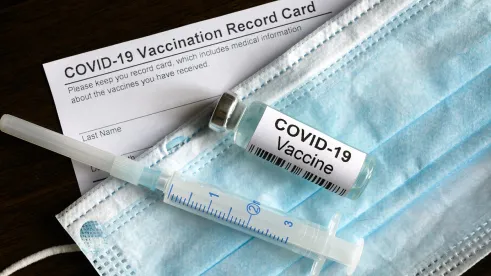On December 19, 2022, a panel for the U.S. Court of Appeals for the Fifth Circuit affirmed a preliminary injunction blocking enforcement of President Joe Biden’s COVID-19 federal contractor vaccine mandate. The 2-1 panel decision in State of Louisiana v. Biden found that to allow the mandate would result in an “enormous,” “transformative,” and “truly unprecedented” expansion of the powers of the president without clear authorization from Congress.
The decision upheld a preliminary injunction applying to Louisiana, Indiana, and Mississippi that was issued by the United States District Court for the Western District of Louisiana. Those states had filed a lawsuit challenging President Biden’s September 2021 Executive Order 14042 and related federal regulatory actions by the Safer Federal Workforce Task Force, the Office of Management and Budget (OMB), and the Federal Acquisition Regulation (FAR) Council. Central to those actions is a mandate that federal government contractors and subcontractors require their employees to become fully vaccinated against COVID-19.
On appeal, the Fifth Circuit panel majority acknowledged that the president’s power to regulate government contracts under the Federal Property and Administrative Services Act of 1949, commonly known as the “Procurement Act,” is very broad. Under the Procurement Act, the president must only demonstrate a “sufficiently close nexus” between an executive order and “the values of economy and efficiency.”
However, according to the majority opinion by Judge Kurt Engelhardt, the major questions doctrine serves as an “extra-statutory limitation[]” on the president’s power. Without such a limitation, the majority reasoned that the president could then, “hypothetically,” mandate that federal contractors require all employees to reduce their body mass index (BMI) “on the theory that obesity is a primary contributor to unhealthiness and absenteeism.” The “only practical limit on presidential authority in this sphere” would then be “the executive’s ability to tie policy priorities to a notion of economy or efficiency,” the majority stated.
The majority rejected the government’s argument that the federal contractor vaccine mandate was more similar to the vaccine mandate that applied to Medicare and Medicaid facilities, which the Supreme Court upheld, than to OSHA’s private employer vaccine mandate, which was blocked by the Supreme Court. The majority reasoned that the federal contractor vaccine mandate was “neither a straightforward nor predictable example of procurement regulations authorized by Congress to promote economy and efficiency.” The majority was also skeptical that the “mandate is within the longstanding practice and construction of the President’s Procurement Act Authority.”
The majority further explained that other executive orders that have been issued under a president’s Procurement Act authority—such as a mandate that federal contractors use “E-Verify” to verify the employment eligibility of their employees or a mandate requiring contractors to provide paid sick leave to employees—govern the conduct of employers. The majority said the contractor vaccine mandate, however, “purports to govern the conduct of employees—and more than their conduct, purports to govern their individual healthcare decisions.”
Under the major questions doctrine, such an expansive interpretation of the president’s power is impermissible “absent a clear statement by Congress that it wishes to endow the presidency with such power.” Here, Congress had not clearly given the president such authority.
In a dissenting opinion to the Fifth Circuit ruling, Judge James Graves Jr. argued that the majority’s consideration of the major questions doctrine was “misplaced.” He also argued that “economic factors would prevent the president from handicapping the contractor workforce with extreme contractual terms.” Judge Graves further argued that if the president tried to implement “draconian measures outside the mainstream of American companies, he or she would hear from the people or from Congress.”
Enforcement of the federal contractor vaccine mandate has been on hold amid multiple ongoing legal challenges, even after the Eleventh Circuit Court of Appeals narrowed the scope of a nationwide injunction blocking the mandate in a case involving seven other states—Alabama, Georgia, Idaho, Kansas, South Carolina, Utah, and West Virginia—and a construction industry trade association. In October 2022, the Safer Federal Workforce Task Force and the OMB told federal agencies not to take any steps toward implementing or enforcing the vaccine mandate until additional guidance is issued.
Key Takeaways
The federal litigation over enforcement of the contractor COVID-19 vaccine mandate complicates compliance for covered federal contractors and subcontractors, especially if the Biden administration moves forward with enforcing the mandate while injunctions are in effect in several states and multiple lawsuits are pending. Covered federal contractors and subcontractors may want to monitor the Safer Federal Workforce Task Force website for further guidance.




 />i
/>i
